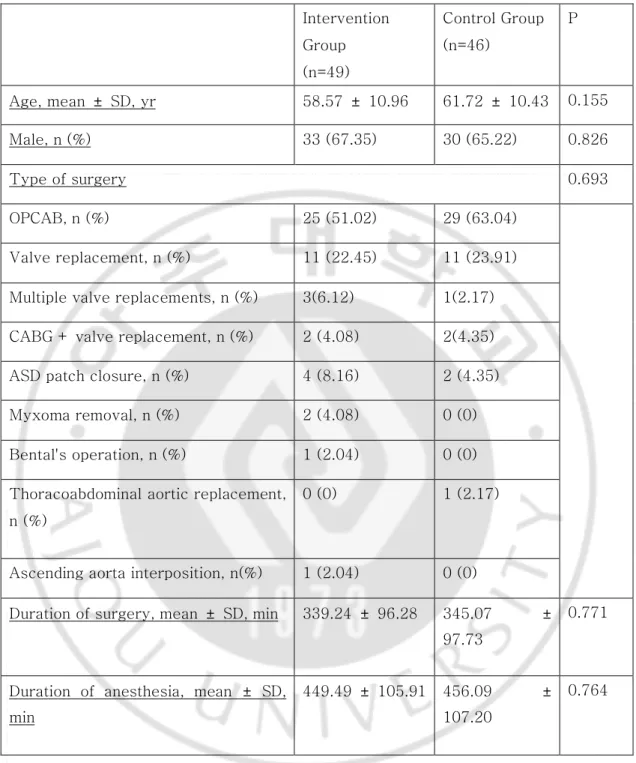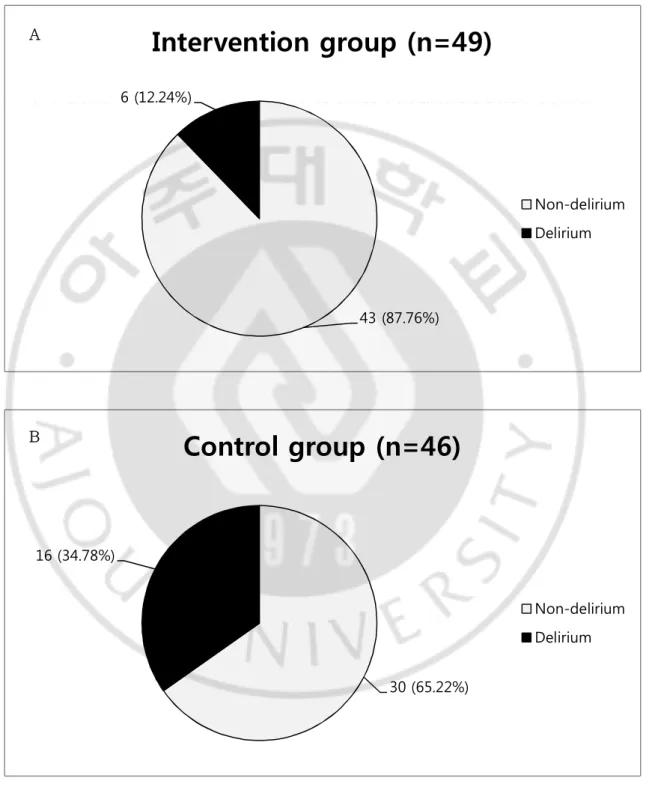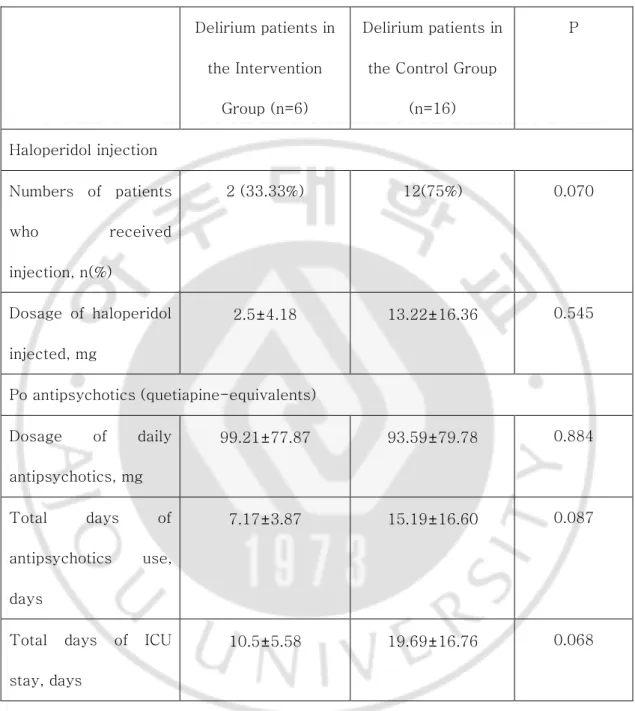저작자표시-비영리-변경금지 2.0 대한민국 이용자는 아래의 조건을 따르는 경우에 한하여 자유롭게 l 이 저작물을 복제, 배포, 전송, 전시, 공연 및 방송할 수 있습니다. 다음과 같은 조건을 따라야 합니다: l 귀하는, 이 저작물의 재이용이나 배포의 경우, 이 저작물에 적용된 이용허락조건 을 명확하게 나타내어야 합니다. l 저작권자로부터 별도의 허가를 받으면 이러한 조건들은 적용되지 않습니다. 저작권법에 따른 이용자의 권리는 위의 내용에 의하여 영향을 받지 않습니다. 이것은 이용허락규약(Legal Code)을 이해하기 쉽게 요약한 것입니다. Disclaimer 저작자표시. 귀하는 원저작자를 표시하여야 합니다. 비영리. 귀하는 이 저작물을 영리 목적으로 이용할 수 없습니다. 변경금지. 귀하는 이 저작물을 개작, 변형 또는 가공할 수 없습니다.
Perioperative psycho-educational intervention
can reduce postoperative delirium in patients
after cardiac surgery
by
Jeewon Lee
Major in Medicine
Department of Medical Sciences
The Graduate School, Ajou University
Perioperative psycho-educational intervention
can reduce postoperative delirium in patients
after cardiac surgery
by
Jeewon Lee
A Dissertation Submitted to The Graduate School of
Ajou University in Partial Fulfillment of the Requirements
for the Degree of Master of Medicine
Supervised by
Jai Sung Noh, M.D.
Major in Medicine
Department of Medical Sciences
The Graduate School, Ajou University
This certifies that the dissertation
of Jeewon Lee is approved.
SUPREVISORY COMMITTEE
Jai Sung Noh
Young Ki Chung
Sun Mi Cho
The Graduate School, Ajou University
December 17th, 2012
i Abstract
Objective: Postoperative delirium after cardiac surgery is associated with many
consequences such as poorer functional recovery, more frequent postoperative complications, higher mortality, increased length of hospital stay, and higher hospital costs. The aim of this study was to evaluate the efficacy of perioperative psycho-educational intervention in preventing postoperative delirium in post cardiac surgery patients.
Method: We conducted a comparative retrospective study between 49 patients who had
received perioperative psycho-educational intervention and 46 patients who had received standard care. The primary outcome was the incidence of postoperative delirium. Secondary outcomes included length of ICU stay, and severity and duration of postoperative delirium among the patients who had developed delirium.
Results: The incidence of postoperative delirium was significantly lower in the intervention
group than that in the control group (12.24% vs. 34.78%, P=0.009). Among the patients who had developed postoperative delirium, there was no statistical difference between the two groups regarding secondary outcomes.
Conclusions: Our results show that the patients who received perioperative
ii
after cardiac surgery than those who received standard care. Clinicians would be able to implement this psycho-educational intervention as part of routine practice to reduce delirium.
iii
TABLE OF CONTENTS
ABSTARCT ··· i
TABLE OF CONTENTS ··· iii
LIST OF FIGURES ··· iv LIST OF TABLES ··· v I. INTRODUCTION ··· 1 II. METHOD ··· 3 A. PATIENTS ··· 3 B. PSYCHO-EDUCATIONAL INTERVENTION ··· 5 C. OUTCOME MEASUREMENT ··· 7 D. STATISTICAL ANALYSIS ··· 8 III. RESULTS ··· 9 A. PATIENT POPULATION ··· 9 B. INCIDENCE OF DELIRIUM ··· 11 C. SECONDARY OUTCOMES ··· 13 III. DISCUSSION ··· 15 III. CONCLUSION ··· 19 REFERENCES ··· 20 국문요약 ··· 24
iv
LIST OF FIGURES
Fig. 1. Flow diagram of the study ··· 4
Fig. 2. Incidence of postoperative delirium among patients in the intervention group(A) and in the control group(B) ··· 12
v
LIST OF TABLES
Table 1. Psycho-educational intervention ··· 6
Table 2. Baseline demographics and perioperative characteristics of all patients ··· 10
Table 3. Outcomes of patients who had development of postoperative delirium in both groups ··· 14
1
Introduction
Delirium is a transient mental syndrome characterized by acute and fluctuating disturbances in consciousness, cognition, and perception (Inouye, 2006). It is a common and serious complication, especially in elderly patients undergoing surgery (Leung, 2010). Although all patients who undergo major surgery are at risk for delirium, patients who undergo cardiac surgery have an increased risk of developing delirium (Andrejaitiene and Sirvinskas, 2012).
Postoperative delirium after cardiac surgery is associated with many consequences such as poorer functional recovery, more frequent complications, higher mortality, increased length of hospital stay, and higher hospital costs (Burkhart et al., 2010; Kazmierski et al., 2010). Furthermore, postoperative delirium has negative impacts on patients’ long-term outcomes as well, developing long-term cognitive impairment and lowered quality of life (Rothenhausler et al., 2005; Koster et al., 2012). It was also reported that delirium after cardiac surgery is a strong independent predictor of death for up to 10 years postoperatively (Gottesman et al., 2010). Consequently, prevention is clearly the key strategy when addressing postoperative delirium (Francis and Kapoor, 1992; Steiner, 2011).
2
a variety of poorer outcomes, including greater pain, longer hospital stays, more postoperative complications, and poorer treatment compliance (Mathews and Ridgeway, 1981). Th ere have been reports on the effects of psycho-educational care on the recovery, pain, and psychological distress of adult surgical patients (Devine, 1992). These consequences can all contribute in developing postoperative delirium. Accordingly, our hypothesis was that perioperative psycho-educational intervention which its goal is to reduce anxiety associated with surgery can contribute in preventing postoperative delirium.
The aim of this study was to evaluate the efficacy of perioperative psycho-educational intervention in preventing postoperative delirium in patients undergoing elective cardiac surgery. The secondary objectives included the severity and duration of postoperative delirium, and length of ICU stay among the patients who had development of postoperative delirium.
3
Method
Patients
At Ajou University Medical Center, perioperative psycho-educational intervention has routinely been provided for all the patients undergoing elective cardiac surgery in order to prevent postoperative delirium, since April, 2011. We conducted a retrospective study on all patients who had been subjected to cardiac surgery from April 2011 to October 2011. Patients who had cardiac surgery from April 2010 to October 2010 were included in the analysis as the control group. This study was approved by the Ajou Institutional Review Board (IRB).
Only adult patients (over 18 years old) and those who had elective cardiac surgery were included in the analysis. Patients who had severe postoperative complication and couldn’t receive psycho-educational intervention after the surgery, such as those who underwent re-operation due to massive postoperative bleeding, those who received ECMO(Extracorporeal Membrane Oxygenation), and those who expired within a week after the surgery were excluded. Additionally, patients who did not speak or understand fluent Korean were also excluded.
4 Figure 1. Flow diagram of the study.
Patients reviewed
April ~ October, 2011 Elective cardiac surgery
Adult (n=56) 7 Patients excluded 3 Expired 3 Reoperation 1 Language barrier 11 Patients excluded 1 Expired 8 Reoperation 1 ECMO 1 Language barrier
Included in analysis as the intervention group
(n=49)
Included in analysis as the control group
(n=46)
April ~ October, 2010 Elective cardiac surgery
Adult (n=57)
5
Psycho-educational intervention
Psycho-educational intervention based on a structured protocol was performed by a single surgical resident who had been educated by a psychiatric consultant. The psycho-educational intervention was performed twice, once before the surgery and the other after the surgery when the patient woke up from the anesthesia in the ICU. Before the surgery, the surgical resident established therapeutic relationship with the patient, provided information on the ICU settings and procedures that one would receive after the surgery like intubation and physical restraints. Education about expected neuropsychiatric sequelae such as postoperative delirium was also included. After the surgery, the surgical staff reminded the patient of the prior education on one’s postoperative state, and provided explanation of all the procedures currently being taken, as well as future treatment plans. Patients were reassured that all the inconvenience or discomfort would only be temporary and were encouraged to share their concerns and feelings. It was made sure that the surgical staff provided emotional support and empathy for the patients. The contents of the psycho-educational intervention are summarized in Table 1.
No other changes in surgical staff or procedures other than the perioperative psycho-educational intervention were made during the intervention time period.
6 Table 1. Psycho-educational intervention
Preoperative care Establish therapeutic relationship
Inform about the ICU setting
Explain the procedures expected after surgery (Intubation,
physical restraints, etc.)
Educate possible postoperative complications including
delirium
Encourage to share one’s concerns and feelings
Assure that one would be in good care
Postoperative care Remind the prior education
Explain current status and procedures
Inform future treatment plans
Reassure that all the inconvenience or discomfort would be
temporary
Encourage to share one’s concerns and feelings
7
Outcome measurement
The primary outcome of this study was incidence of postoperative delirium within 7 days after surgery. Postoperative delirium was diagnosed according to the DSM-IV criteria by a psychiatric consultant, after the thorough review of all medical records of the patients. The investigator extracting the chart data were blinded as to whether the patient was in the control or intervention group.
Secondary outcomes were the severity and duration of postoperative delirium and total length of ICU stay. The severity and duration of the postoperative delirium was assessed by the total amount and days of antipsychotics given orally for the treatment of delirium. Patients who received haloperidol injection for the treatment of postoperative delirium were considered to have more severe symptoms of delirium. Antipsychotics given orally for the treatment of postoperative delirium were mostly quetiapine. Only few patients were treated with risperidone and haloperidol. Dosages of risperidone and haloperidol were converted to equivalent dosage of quetiapine for comparison (Andreasen et al., 2010).
8
Statistical Analysis
The Student’s t-test, chi-square test, and Fisher’s exact test were used as appropriate for the analysis of data. Statistical analyses were performed on SPSS 18.0 software. Statistical tests were two-sided, and p<0.05 were considered statistically significant.
9
Results
Patient population
Of the 56 adult patients who had elective cardiac surgery from April 2011 to October 2011, 7 patients were excluded. A total of 49 patients were included in the analysis as the intervention group. Of the 57 patients who had elective cardiac surgery from April 2010 to October 2010, 11 patients were excluded. A total of 46 patients were included in the analysis as the control group (Figure 1). There was no significant difference between the groups regarding patient demographics and operative characteristics (Table 2).
10
Table 2. Baseline demographics and perioperative characteristics of all patients Intervention Group (n=49) Control Group (n=46) P Age, mean ± SD, yr 58.57 ± 10.96 61.72 ± 10.43 0.155 Male, n (%) 33 (67.35) 30 (65.22) 0.826 Type of surgery 0.693 OPCAB, n (%) 25 (51.02) 29 (63.04) Valve replacement, n (%) 11 (22.45) 11 (23.91)
Multiple valve replacements, n (%) 3(6.12) 1(2.17)
CABG + valve replacement, n (%) 2 (4.08) 2(4.35)
ASD patch closure, n (%) 4 (8.16) 2 (4.35)
Myxoma removal, n (%) 2 (4.08) 0 (0)
Bental's operation, n (%) 1 (2.04) 0 (0)
Thoracoabdominal aortic replacement, n (%)
0 (0) 1 (2.17)
Ascending aorta interposition, n(%) 1 (2.04) 0 (0)
Duration of surgery, mean ± SD, min 339.24 ± 96.28 345.07 ± 97.73
0.771
Duration of anesthesia, mean ± SD, min
449.49 ± 105.91 456.09 ± 107.20
11
Incidence of delirium
The incidence of postoperative delirium within the first 7 days after surgery was significantly lower in the intervention group than in the control group (12.24% vs. 34.78%, P=0.009, Figure 2.). Only 6 out of 49 patients had developed postoperative delirium in the intervention group, while 16 out of 46 patients had developed postoperative delirium in the control group.
12
Figure 2. Incidence of postoperative delirium among patients in the intervention
group(A) and in the control group(B).
43 (87.76%) 6 (12.24%)
Intervention group (n=49)
Non-delirium Delirium 30 (65.22%) 16 (34.78%)Control group (n=46)
Non-delirium Delirium A B13
Secondary outcomes
The mean duration of antipsychotics given orally(quetiapine-equivalents) tended to be longer in the control group compared to the intervention group, even though there were no statistical difference. (Table 3) Only 33.33% of patients who had developed delirium in the intervention group had been injected with haloperidol for the treatment of postoperative delirium, while 75% of those in the control group had received haloperidol injection. Additionally, mean duration of ICU stay after surgery in patients who had developed delirium was 10.5±5.58 days in the intervention group and 19.69±16.76 days in the control group. However, there was no statistical difference between the two groups regarding secondary outcomes.
14
Table 3. Outcomes of patients who had development of postoperative delirium in
both groups.
Delirium patients in the Intervention
Group (n=6)
Delirium patients in the Control Group
(n=16) P Haloperidol injection Numbers of patients who received injection, n(%) 2 (33.33%) 12(75%) 0.070 Dosage of haloperidol injected, mg 2.5±4.18 13.22±16.36 0.545 Po antipsychotics (quetiapine-equivalents) Dosage of daily antipsychotics, mg 99.21±77.87 93.59±79.78 0.884 Total days of antipsychotics use, days 7.17±3.87 15.19±16.60 0.087
Total days of ICU stay, days
15
Discussion
Our results show that the group of patients who received perioperative psycho-educational intervention was associated with a lower incidence of postoperative delirium (12.24%) after cardiac surgery than those who received standard care (34.78%). Since the incidence of delirium in patients after cardiac operations ranged from 13.5% to 41.7% (Koster et al., 2008), perioperative psycho-educational intervention reduced the incidence of postoperative delirium below normally reported range.
Our study showed that perioperative psycho-educational intervention reduced the incidence of delirium, but not its severity or duration, and nor did it reduce total length of ICU stay. It is consistent with the previous studies which showed that once delirium exists, it is difficult to influence its duration (Lonergan et al., 2007). On the other hand, number of patients who developed postoperative delirium in both groups could have been too small to prove any statistical result.
Surgery is a threatening experience, with multiple stressful components such as worries about one’s physical condition, anticipation of painful procedures, and concerns about survival and recovery. Accordingly, it is not surprising that greater distress or anxiety prior to surgery is associated with a slower and more complicated postoperative recovery
16
(1990). The fact that low perioperative anxiety predicts favorable postoperative outcomes underlies many interventions in which the aim is to reduce preoperative anxiety (Kain and Caldwell-Andrews, 2005). Whatever their content, many preoperative interventions may benefit recovery in part because they provide additional interpersonal support during a stressful time. Primary goal of our psycho-educational intervention was also to reduce anxiety or stress associated with surgery for the patient.
Various pharmacologic agents (such as antipsychotics, acetylcholinesterase inhibitors, sleep-wake cycle regulators and etc.) have been assessed for potential roles in postoperative delirium prevention (Aizawa et al., 2002; Alao et al., 2005; Kalisvaart et al., 2005; Liptzin et al., 2005; Prakanrattana and Prapaitrakool, 2007; Sampson et al., 2007; Gamberini et al., 2009; Larsen et al., 2010). However, there is always a concern for the potential side effects of the drugs. Thus no totally safe recommendation can be made for a drug’s clinical use for delirium prevention (Tabet and Howard, 2009). Most non-pharmacological interventions proven to be effective in preventing postoperative delirium used multi-factorial risk models (Inouye et al., 1999; Inouye, 2000; Mouchoux et al., 2011). Still, implementing effective models of multi-factorial risk models in clinical practice is not always easy. Most of the multi-component interventions not only require extra staff
17
including geriatricians, but they also lay time-consuming burden on the surgical staff and nurses as well (Vidan et al., 2009).
The usual clinical team would be able to implement this psycho-educational intervention as part of routine practice, without the need for extra staff. Therefore, perioperative psycho-educational intervention would clearly be a safe and cost-effective method to reduce postoperative delirium with minimal extra work. Furthermore, it would also contribute in enhancing the therapeutic relationship with the patients. On reflection, there is nothing extraordinary about the contents of our psycho-educational intervention. It is no more than basic courtesy and kindness which patients deserve from doctors.
There were several limitations of this study. First and foremost are the limitations inherent to retrospective analyses. Although we used DSM-IV criteria for the diagnosis of delirium, we had to rely on the information within the medical chart. Small sample size is another limitation that could limit our study as preliminary. Also, we did not perform assessment of patients with validated instruments such as MMSE or DRS-R. Additionally, our baseline measure of comorbidities could have been insufficient. Absence of long-term follow-up and assessment of postoperative outcome between two groups other than postoperative delirium are some more limitations. Lastly, our exclusion criteria which
18
excluded patients who had emergent surgery, and those who had serious postoperative complications could have affected the result.
Our study emphasizes a new role for the psychiatrists in management of delirium. Delirium is the most common reason for psychiatric consultation among surgical and medical patients (Diefenbacher and Strain, 2002; Bourgeois et al., 2005). However, since the main management of delirium is identifying and correcting the underlying medical conditions, there is limited means to aid in management of delirium as a psychiatrist, which is symptomatic control, usually with antipsychotics, after making the diagnosis. A greater role of psychiatrists in delirium should be in educating the medical and surgical staff on delirium and emphasizing the beneficial effects of psycho-educational intervention. Most importantly, the strength of our study is that it suggests that all clinicians, not only psychiatrists, can help reduce the development of delirium in the patients with such modest psychosocial intervention.
19
Conclusion
In conclusion, perioperative psycho-educational intervention reduces the incidence of postoperative delirium. It is a safe and cost-effective alternative to prevent postoperative delirium in patients who undergo cardiac surgery. Future prospective studies would be needed on a wider scale.
20
References
1.
Stress and medical procedures, New York, NY, US: Oxford
University Press, pp.viii, 184, 1990
2.
Aizawa K, Kanai T, Saikawa Y, Takabayashi T, Kawano Y,
Miyazawa N, Yamamoto T: A novel approach to the prevention of
postoperative delirium in the elderly after gastrointestinal surgery.
Surg Today 32: 310-314, 2002
3.
Alao AO, Soderberg M, Pohl EL, Koss M: Aripiprazole in the
treatment of delirium. Int J Psychiatry Med 35: 429-433, 2005
4.
Andreasen NC, Pressler M, Nopoulos P, Miller D, Ho BC:
Antipsychotic dose equivalents and dose-years: a standardized
method for comparing exposure to different drugs. Biol Psychiatry
67: 255-262, 2010
5.
Andrejaitiene J, Sirvinskas E: Early post-cardiac surgery delirium
risk factors. Perfusion 27: 105-112, 2012
6.
Bourgeois JA, Wegelin JA, Servis ME, Hales RE: Psychiatric
diagnoses of 901 inpatients seen by consultation-liaison
psychiatrists at an academic medical center in a managed care
environment. Psychosomatics 46: 47-57, 2005
7.
Burkhart CS, Dell-Kuster S, Gamberini M, Moeckli A, Grapow M,
Filipovic M, Seeberger MD, Monsch AU, Strebel SP, Steiner LA:
Modifiable and nonmodifiable risk factors for postoperative
delirium after cardiac surgery with cardiopulmonary bypass.
J
Cardiothorac Vasc Anesth 24: 555-559, 2010
8.
Devine EC: Effects of psychoeducational care for adult surgical
patients: a meta-analysis of 191 studies. Patient Educ Couns 19:
129-142, 1992
9.
Diefenbacher A, Strain JJ: Consultation-liaison psychiatry:
stability and change over a 10-year-period. Gen Hosp Psychiatry
24: 249-256, 2002
10.
Francis J, Kapoor WN: Prognosis after hospital discharge of older
medical patients with delirium.
J Am Geriatr Soc 40: 601-606,
1992
21
11.
Gamberini M, Bolliger D, Lurati Buse GA, Burkhart CS, Grapow M,
Gagneux A, Filipovic M, Seeberger MD, Pargger H, Siegemund M,
Carrel T, Seiler WO, Berres M, Strebel SP, Monsch AU, Steiner LA:
Rivastigmine for the prevention of postoperative delirium in elderly
patients undergoing elective cardiac surgery--a randomized
controlled trial. Crit Care Med 37: 1762-1768, 2009
12.
Gottesman RF, Grega MA, Bailey MM, Pham LD, Zeger SL,
Baumgartner WA, Selnes OA, McKhann GM: Delirium after
coronary artery bypass graft surgery and late mortality. Ann Neurol
67: 338-344, 2010
13.
Inouye SK: Prevention of delirium in hospitalized older patients:
risk factors and targeted intervention strategies.
Ann Med 32:
257-263, 2000
14.
Inouye SK: Delirium in older persons.
N Engl J Med 354:
1157-1165, 2006
15.
Inouye SK, Bogardus ST, Jr., Charpentier PA, Leo-Summers L,
Acampora D, Holford TR, Cooney LM, Jr.: A multicomponent
intervention to prevent delirium in hospitalized older patients.
N
Engl J Med 340: 669-676, 1999
16.
Kain ZN, Caldwell-Andrews AA: Preoperative psychological
preparation of the child for surgery: an update.
Anesthesiol Clin
North America 23: 597-614, vii, 2005
17.
Kalisvaart KJ, de Jonghe JF, Bogaards MJ, Vreeswijk R, Egberts
TC, Burger BJ, Eikelenboom P, van Gool WA: Haloperidol
prophylaxis for elderly hip-surgery patients at risk for delirium: a
randomized placebo-controlled study.
J Am Geriatr Soc 53:
1658-1666, 2005
18.
Kazmierski J, Kowman M, Banach M, Fendler W, Okonski P, Banys
A, Jaszewski R, Rysz J, Mikhailidis DP, Sobow T, Kloszewska I:
Incidence and predictors of delirium after cardiac surgery: Results
from The IPDACS Study. J Psychosom Res 69: 179-185, 2010
19.
Koster S, Hensens AG, Schuurmans MJ, van der Palen J:
Consequences of delirium after cardiac operations.
Ann Thorac
Surg 93: 705-711, 2012
22
20.
Koster S, Oosterveld FG, Hensens AG, Wijma A, van der Palen J:
Delirium after cardiac surgery and predictive validity of a risk
checklist. Ann Thorac Surg 86: 1883-1887, 2008
21.
Larsen KA, Kelly SE, Stern TA, Bode RH, Jr., Price LL, Hunter DJ,
Gulczynski D, Bierbaum BE, Sweeney GA, Hoikala KA, Cotter JJ,
Potter AW: Administration of olanzapine to prevent postoperative
delirium in elderly joint-replacement patients: a randomized,
controlled trial. Psychosomatics 51: 409-418, 2010
22.
Leung JM: Postoperative delirium: are there modifiable risk
factors? Eur J Anaesthesiol 27: 403-405, 2010
23.
Liptzin B, Laki A, Garb JL, Fingeroth R, Krushell R: Donepezil in
the prevention and treatment of post-surgical delirium.
Am J
Geriatr Psychiatry 13: 1100-1106, 2005
24.
Lonergan E, Britton AM, Luxenberg J, Wyller T: Antipsychotics for
delirium. Cochrane Database Syst Rev: CD005594, 2007
25.
Mathews A, Ridgeway V: Personality and surgical recovery: a
review. Br J Clin Psychol 20: 243-260, 1981
26.
Mouchoux C, Rippert P, Duclos A, Fassier T, Bonnefoy M, Comte
B, Heitz D, Colin C, Krolak-Salmon P: Impact of a multifaceted
program to prevent postoperative delirium in the elderly: the
CONFUCIUS stepped wedge protocol. BMC Geriatr 11: 25, 2011
27.
Prakanrattana U, Prapaitrakool S: Efficacy of risperidone for
prevention of postoperative delirium in cardiac surgery.
Anaesth
Intensive Care 35: 714-719, 2007
28.
Rothenhausler HB, Grieser B, Nollert G, Reichart B, Schelling G,
Kapfhammer HP: Psychiatric and psychosocial outcome of
cardiac surgery with cardiopulmonary bypass: a prospective
12-month follow-up study. Gen Hosp Psychiatry 27: 18-28, 2005
29.
Sampson EL, Raven PR, Ndhlovu PN, Vallance A, Garlick N, Watts
J, Blanchard MR, Bruce A, Blizard R, Ritchie CW: A randomized,
double-blind, placebo-controlled trial of donepezil hydrochloride
(Aricept) for reducing the incidence of postoperative delirium after
elective total hip replacement. Int J Geriatr Psychiatry 22: 343-349,
2007
23
30.
Steiner LA: Postoperative delirium. part 2: detection, prevention
and treatment. Eur J Anaesthesiol 28: 723-732, 2011
31.
Tabet N, Howard R: Pharmacological treatment for the prevention
of delirium: review of current evidence. Int J Geriatr Psychiatry 24:
1037-1044, 2009
32.
Vidan MT, Sanchez E, Alonso M, Montero B, Ortiz J, Serra JA: An
intervention integrated into daily clinical practice reduces the
incidence of delirium during hospitalization in elderly patients.
J
Am Geriatr Soc 57: 2029-2036, 2009
24 -국문 요약-
심장 수술 후 섬망 예방에 수술 전후의
지지적 면담의 역할에 대한 고찰
아주대학교 대학원 의학과 이지원 (지도교수: 노재성) 연구 배경: 심장 수술 후 서망은 수술 후 합병증과 사망률을 증가시키는 등의 심각한 결과를 초래하고 재원기간의 연장과 의료비 증가, 수술 후 10 년 이내의 사망률을 높이는 것을 나타났다. 그러므로 수술 후 발생하는 섬망을 조기에 발견하고 중재하는 것이 중요시 되어 왔으나 이보다 섬망 발생을 미리 예방하는 것이 더욱 중요할 것이다. 연구 목적: 수술 전후 지지적 면담이 개심술 후 섬망 빌생의 빈도를 줄일 수 있는 지 평가하고자 하였다. 또 수술 전 후 지지적 면담을 받은 개심술 환자들 중 섬망이 발생한 경우 지지적 면담을 받지 못한 개심술 환자들 중 섬망이 발생한 환자들보다 섬망의 정도가 경한지 평가하고자 하였다. 연구방법: 본 연구에서는 아주대병원 흉부외과에서 2011 년 4 월부터 10 월까지의 기간동안 개심술을 받는 환자들을 대상으로 술 후 섬망 발생 예방을 위해 수술 전 후에 심리적 개입을 시행하고 이의 효과를 알아보기 위해 2010 년 4 월부터 10 월까지 개심술을 받았던 환자들과 비교하여 심리적 개입만으로 개심술 후 섬망 발생을 예방할 수 있는지를 환자의 의무기록을 후향적으로 검토하여 평가하였다.25 연구 결과: 수술 전후에 심리적 개입을 받은 환자들이 그렇지 않은 환자들보다 섬망 발생률이 낮았다. (12.24% vs. 34.78%, p=0.009). 결론: 본 연구에서는 수술 전 후 심리적 개입을 받은 환자들이 그렇지 못한 환자들보다 섬망 발생률이 낮다는 것을 보여주었다. 임상의사들은 본 연구의 심리적 개입을 활용하여 섬망 발생을 줄일 수 있을 것이다. 핵심어: 술 후 섬망, 지지적 면담, 개심술




